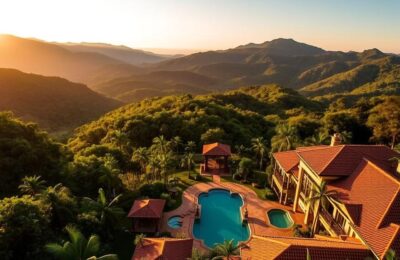Relocating to Costa Rica: A New Life in Paradise
Do you dream of living in a place where the sun always shines and the beaches are beautiful? Costa Rica could be your perfect new home. This article will take you through the world of living in Costa Rica. We’ll cover the immigration process, the lively expat communities, and the amazing quality of life.
Key Takeaways
- Discover the unique Pura Vida lifestyle that emphasizes relaxation, community, and well-being.
- Explore the diverse range of landscapes, from bustling cities to serene beaches and lush rainforests.
- Learn about the immigration process and the various visa options available for relocating to Costa Rica.
- Uncover the vibrant expat communities and the support they offer during the transition to a new life.
- Delve into the rich cultural heritage and the abundance of outdoor activities that make Costa Rica a true paradise.
Embracing the Pura Vida Lifestyle: Relaxation and Contentment
Costa Rica is perfect for those wanting a peaceful life. It’s all about family, community, and well-being, not just money or success. This way of life is called “Pura Vida.”
Expats in Costa Rica get to live this calm and refreshing life. The country’s beautiful nature, like its beaches and rainforests, sets the stage for a life of ease. It’s a chance to really feel the Pura Vida spirit.
Integrating into the Community
Joining the Costa Rican community is easy for expats. People here are friendly, making it simple to make friends and join in. You can volunteer, join clubs, or start a business, adding to the lively expat communities in Costa Rica.
- Embrace the Pura Vida lifestyle and enjoy the tranquility and contentment it brings
- Immerse yourself in Costa Rica’s stunning natural landscapes, from pristine beaches to lush rainforests
- Easily integrate into the warm and welcoming Costa Rican community, making meaningful connections and becoming part of the expat communities
- Explore the numerous opportunities to volunteer, join clubs or groups, or even start a new business in Costa Rica

Retirees find paradise in Costa Rica. It’s perfect for enjoying their golden years with its low cost of living, lovely weather, and good healthcare. This makes it a top choice for those wanting to retire in Costa Rica.
Living the Pura Vida life and being part of the expat communities in Costa Rica brings peace and happiness. It’s what makes Costa Rica a paradise for expats.
Unveiling Costa Rica’s Natural Wonders: A Paradise for Nature Lovers
Dive into the stunning natural beauty of Costa Rica, a haven for those who love nature. This country in Central America is famous for its stunning views, from green rainforests to untouched beaches and a wide variety of wildlife. If you’re thinking about moving to Costa Rica or just want to see its beauty, you’ll find wonders here.
The Arenal Volcano is a top spot in Costa Rica. It’s an active volcano in the Arenal Volcano National Park. You can hike, zipline, or relax in hot springs while taking in the volcano’s beauty. For a calm day, visit Manuel Antonio National Park. It has beautiful beaches, trails, and lots of wildlife, like monkeys, sloths, and colorful birds.
Costa Rica also has the Monteverde Cloud Forest, a place full of life and birds. It’s perfect for those who love expat life and birds. You can see over 400 types of birds, including toucans and quetzals.
Costa Rica is great for eco-tourism and outdoor fun. You can hike, kayak, surf, or snorkel. It’s a great way for ex-pat communities to enjoy the costa rica weather and central america relocation life.

If you love adventure or just want a peaceful retirement in costa rica, you’ll love it here. Costa Rica’s landscapes, wildlife, and lifestyle are unforgettable. Get ready to be amazed by the beauty of nature and the joy of living in the great outdoors.
Exploring Costa Rica’s Culinary Delights: Flavors of Paradise
As a costa rica expat, you’ll love the vibrant food scene here. Costa Rican food mixes indigenous, Spanish, and international tastes. It’s a true celebration of the country’s culture.
Don’t miss trying gallo pinto, a filling breakfast dish with rice and beans. It often comes with eggs, plantains, and a tasty sauce. Another must-try is ceviche, a cool seafood dish with raw fish, shrimp, or octopus, and a zesty lime dressing.
Local Markets and Fresh Produce
For a real taste of the area, visit local markets in Costa Rica. They’re full of fresh fruits, vegetables, and artisanal goods. You can find everything from tropical fruits to handcrafted breads and cheeses.
Costa Rica’s immigration has also brought a wide range of international foods. You can enjoy Italian, French, or Asian fusion dishes easily.
And don’t forget the famous Costa Rican coffee. It’s among the best in the world. The country’s perfect climate and fertile soil make it a paradise for coffee lovers. You’ll find many aromatic and flavorful brews.
Whether you’re trying a traditional dish or exploring new tastes, your taste buds will love Costa Rica’s food. It’s a culinary journey you won’t forget.

Relocating to Costa Rica: A Seamless Transition with CRIE
Thinking about moving to Costa Rica? The immigration and residency process might seem tough. But, there’s a pro team ready to help: Costa Rica Immigration Experts (CRIE). They’ve been guiding people from all over the world to Costa Rica for over ten years.
CRIE has a team of pros who offer help with immigration, residency applications, and even citizenship. What makes CRIE stand out is their goal to ease the process for you. They take care of all the paperwork and legal stuff, so you can enjoy starting your new life.
CRIE knows every move is different. They make sure their help fits your specific situation. Whether you’re retiring or moving for work, CRIE can make your move smooth and fun.

CRIE helps with everything from work permits to residency and even digital nomad visas. Their full range of services means you can start your life in Costa Rica without a hitch. With CRIE, you can look forward to your new adventure in this lovely country.
Immersing in Costa Rican Culture: A Fascinating Experience
Exploring Costa Rica offers a chance to dive into its lively culture. You’ll find everything from traditional music to local food, each a delight for your senses.
“Pura Vida” means “pure life” in Costa Rica. It’s all about enjoying life with family and friends. This way of life draws many expats to retirement in costa rica or central america relocation.
Costa Rica’s culture mixes indigenous, Spanish, and African roots. You can enjoy traditional music or check out art and museums. It’s a unique experience of tropical living.
The locals, known as Ticos, are very friendly. They love sharing their culture and making visitors feel welcome. This makes it easy for ex-pat communities to settle in.
Living in Costa Rica is rewarding. You get to know its history and traditions. It’s a peek into the “Pura Vida” lifestyle that many love.

Conclusion
Relocating to Costa Rica is a chance to live differently in a tropical paradise. It’s about enjoying the Pura Vida lifestyle, exploring nature, and tasting local foods. Costa Rica has a lot to offer, whether you want peace, adventure, or a new pace of life.
Experts like CRIE make moving here easy. They help with everything from finding a place to live to getting settled in.
Living in Costa Rica means diving into a rich culture and meeting friendly expats. The country is beautiful, living costs less, and healthcare is good. It’s perfect for starting a new life in a sunny place.
Thinking about moving to Costa Rica fills us with excitement. We look forward to living in a place with such a vibrant culture. We’re ready to take on all the adventures Costa Rica has to offer.
FAQ
What is the Pura Vida lifestyle in Costa Rica?
What are some of the natural wonders and attractions in Costa Rica?
What is the culinary scene like in Costa Rica?
How can CRIE help with the relocation process to Costa Rica?
What are some of the cultural experiences available in Costa Rica?
Source Links
- https://crie.cr/whats-it-like-living-in-costa-rica/
- https://aurea-designs.com/blog/relocating-to-costa-rica/
- https://gap.cr/moving-to-costa-rica/
- https://rebeccaclower.com/costa-rica-development/embracing-the-pura-vida-lifestyle-lessons-on-life-building-investing
- https://crie.cr/lifestyle-in-costa-rica/
- https://www.coastalrealtycostarica.com/the-gold-coast-blog/costa-rica-homes-embracing-the-pura-vida-lifestyle
- https://crie.cr/costa-rica-immigration-expert-services-overview/
- https://www.entercostarica.com/attractions
- https://crie.cr/unveiling-costa-rica-a-comprehensive-relocation-seminar/
- https://www.the5worldexplorers.com/exploring-costa-rica/
- https://crie.cr/permanent-residency-in-costa-rica/
- https://crie.cr/costa-rican-cuisine/
- https://elmangroove.net/savor-the-flavors-of-paradise-exploring-the-culinary-delights-of-el-mangroove-hotels-restaurants/
- https://flamingobeachrealty.com/savor-the-flavors-a-food-lovers-guide-to-costa-rican-cuisine/
- https://crie.cr/work-permit-in-costa-rica/
- https://crie.cr/digital-nomad-visa-in-costa-rica/
- https://crie.cr/residency-requirements-in-coste-rica/
- https://crie.cr/costa-rica-transition-guide-relocation-seminar/
- https://crie.cr/tips-for-moving-to-costa-rica/
- https://gap.cr/how-to-immigrate-to-costa-rica/
- https://crie.cr/citizenship-in-costa-rica/
- https://crie.cr/about-crie/
- https://crie.cr/daily-life-in-costa-rica-2/
- https://www.liveincostarica.com/blog/settling-in-to-costa-rican-culture-and-lifestyle.html
- https://costaricafrika.com/category/living-in-costa-rica/
- https://crie.cr/frequently-asked-questions/
- https://crie.cr/relocating-to-costa-rica/
- https://crie.cr/10-reasons-to-move-to-costa-rica/
- https://unstoppablestaceytravel.com/tips-for-a-move-to-costa-rica-from-usa/




